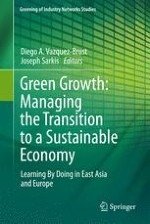
2012 | OriginalPaper | Chapter
1. Green Growth: Managing the Transition to Sustainable Economies
Authors : Diego A. Vazquez-Brust, Joseph Sarkis
Published in: Green Growth: Managing the Transition to a Sustainable Economy
Publisher: Springer Netherlands
Activate our intelligent search to find suitable subject content or patents.
Select sections of text to find matching patents with Artificial Intelligence. powered by
Select sections of text to find additional relevant content using AI-assisted search. powered by